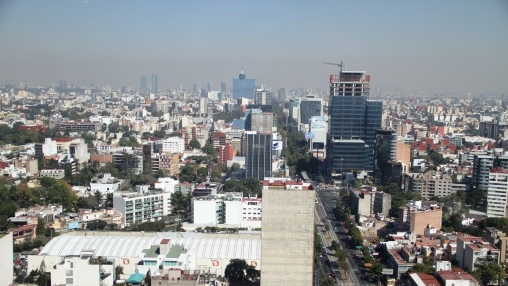Itchy eyes, dry throat, runny nose: These are common in Mexico City, where air quality continues to worsen. Just a few weeks ago, an environmental alert recommended that the city’s residents avoid outdoor physical exercises. All school activities outside the classrooms were forbidden.
However, in the Federal District, as in all of Mexico, enormous efforts are being made to reduce greenhouse gas (GHG) emissions. Public transport such as the Metrobus, and projects such as Ecobikes, are helping people leave the car behind and use clean transport options.
Projects that promote energy efficiency also help, such as the distribution of at least 23 million energy-saving light bulbs to Mexicans. This initiative earned the country a Guinness record.
And this matters: The country’s largest emissions come from energy generation, according to the national climate change strategy. Overall, GHG emissions grew by 33 percent between 1990 and 2010.
“In Mexico, we are implementing solid emission reduction measures. Only that gives us the moral strength to call here, in this forum, to all countries to assume a responsibility for their own commitments”, said Secretary Juan José Guerra Abud at the COP19 in November, 2013.
Greenhouse gas emissions are not just a problem for Mexico, but for the entire planet. If we continue to do business as usual, global temperatures could increase by up to 4° Celsius by 2100, according to a World Bank report. This would mean more heat waves, less crop yields, and ocean acidification.
“Climate change is the largest challenge we will face as a global community. Undoubtedly, it is the greatest challenge we will face as human beings during this century,” said Luis Alfonso Muñozcano, Deputy General Director for climate change projects in SEMARNAT, the Mexican Department of the Environment and Natural Resources.
This week, the members of the Partnership for Market Readiness (PMR) will meet in Mexico. The PMR helps countries move toward a low-carbon economy through market mechanisms. Mexico is one of 30 countries that participate.
"The PMR is a platform for developed and developing countries to exchange best practices in their road toward a more sustainable development. Today in Mexico City, we see a huge push for action, where countries such as Mexico are adopting specific mitigation measures,” added Xueman Wang, PMR Team Leader.
For instance, the partnership is helping Mexico carry out integrated urban mobility system activities; less polluting cooling gases; and sustainable urban communities. In Costa Rica, activities focus on carbon neutrality while in Chile, they support the preparation for pilot emissions trading system in the energy sector.

